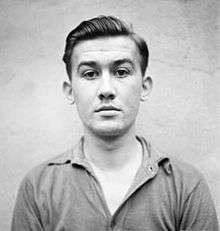Wilhelm Dörr (Nazi)
Wilhelm Dörr (9 February 1921 – 13 December 1945) was a German SS-Oberscharführer[1] and concentration camp officer. He served as a guard at the Mittelbau-Dora concentration camp and as deputy commander of the sub-camp of Kleinbodungen. Following World War II he was convicted of war crimes by British occupation authorities in the Belsen Trial and executed.
Wilhelm Dörr | |
|---|---|
 Wilhelm Dörr in British Custody, 1945 | |
| Born | 9 February 1921 Merenberg, Hesse, Germany |
| Died | 13 December 1945 (aged 24) Hamelin prison, Germany |
| Allegiance | |
| Service/ | Schutzstaffel |
| Rank | Oberscharführer |
| Unit | SS-Totenkopfverbände |
| Battles/wars | World War II |
Life
Wilhelm Dörr was born in the town of Merenberg, Hesse on February 9, 1921 and raised in Emmerichenhain (Rennerod) where he worked primarily as a farmhand. Dörr was a member of the Hitler Youth from 1932 to 1939 and volunteered for the Waffen-SS in December 1940 after being rejected for service by the Wehrmacht.[2] While training to become a combat engineer in Dresden in October 1941 he became seriously ill with rheumatism and was confined to a hospital for several months. Following his recovery, Dörr was reassigned to the SS-Totenkopfverbände in the summer of 1942. He went on to serve as a guard at the Sachsenhausen concentration camp until December 1943.[3]
In January 1944 Dörr was transferred to the Mittelbau-Dora concentration camp where he initially functioned as Blockführer (Block Leader) in the central camp complex before being appointed as deputy to Hauptscharführer Franz Stofel, commander of the sub-camp of Kleinbodungen, in September 1944.
At Kleinbodungen, Dörr helped manage roughly 620 camp inmates used as slave-laborers in Mittelwerk, the armaments production facility used to manufacture Germany’s V-2 ballistic missiles. When US troops appeared poised to capture Mittelbau-Dora and its environs in April 1945, the evacuation of the camp was ordered. Dörr was one of 45 SS men who led a brutal death march of hundreds of Kleinbodungen inmates to the Bergen-Belsen concentration camp in Lower Saxony. During the journey the SS conducted numerous summary executions of prisoners who attempted to escape or otherwise slowed the progress of the march.[4]
Four days after Dörr and his group arrived at Bergen-Belsen the camp was liberated by British troops. He was arrested and indicted for the atrocities which had occurred during the death march from Mittelbau-Dora. Dörr was tried along with 45 other alleged war criminals before a British military court in Lüneburg as part of the so-called Belsen Trial.[5] He pleaded not guilty to the charges but was nevertheless convicted and sentenced to death. Dörr was executed by hanging in Hamelin prison on 13 December 1945.[6] His executioner was Albert Pierrepoint, aided by an assistant.
References
- Jens Christian Wagner: Kleinbodungen central warehouse, in: Wolfgang Benz , Barbara Distel (ed.): The place of terror - History of the Nazi concentration camp, Volume 7, Munich 2008, pp. 317
- Dorr Basic Information, British Belsen Trial Online# bergen.belsen.co.uk
- Jens Christian Wagner: Kleinbodungen central warehouse, in: Wolfgang Benz , Barbara Distel (ed.): The place of terror - History of the Nazi concentration camp, Volume 7, Munich 2008, pp. 316f. 316f
- Sellier, Andre. A History of the Dora Camp. Chicago:Ivan R. Dee. 2003, Biographical Bibliography# A History of the Dora Camp by Andre Sellier
- Dorr Basic Information, British Belsen Trial Online# bergen.belsen.co.uk
- Working Group on Tracing - National Socialism in the Westerwald: Remembering for the Future - 60 years after the liberation of the Nazi regime in the Westerwald, Montabaur 2005, pp. 13f# Working group on tracing national socialism